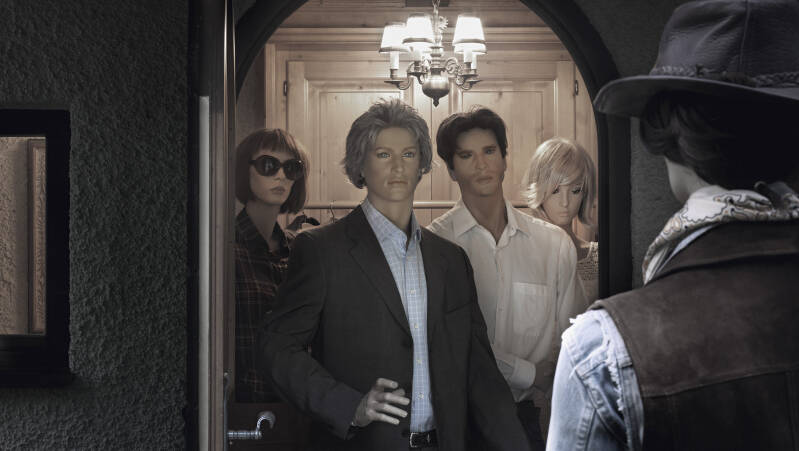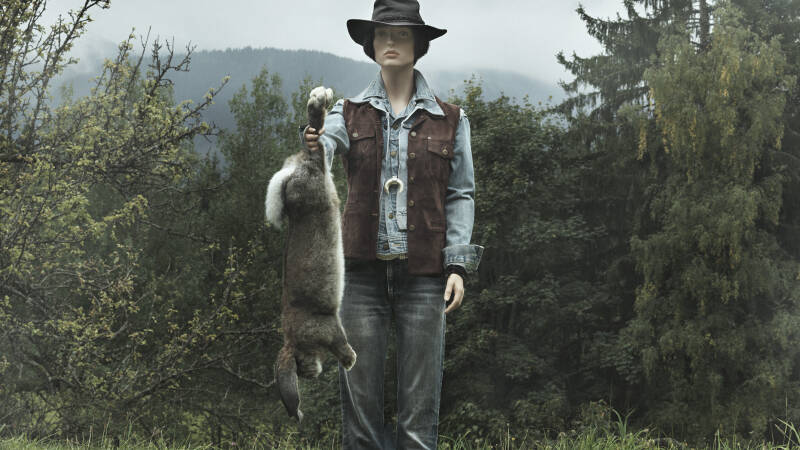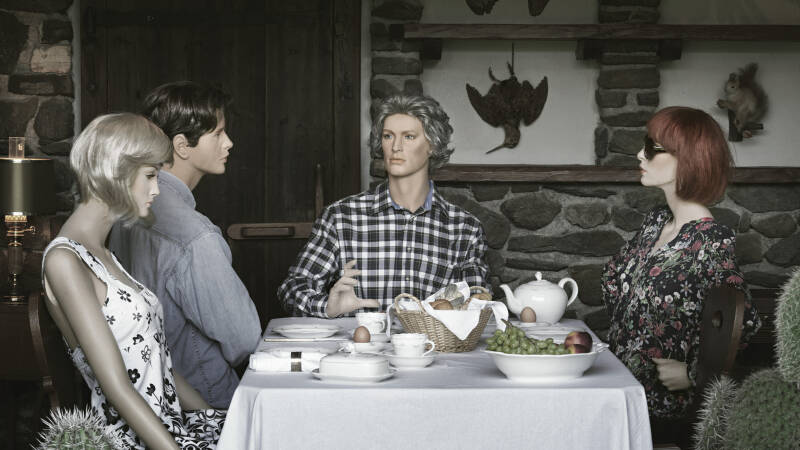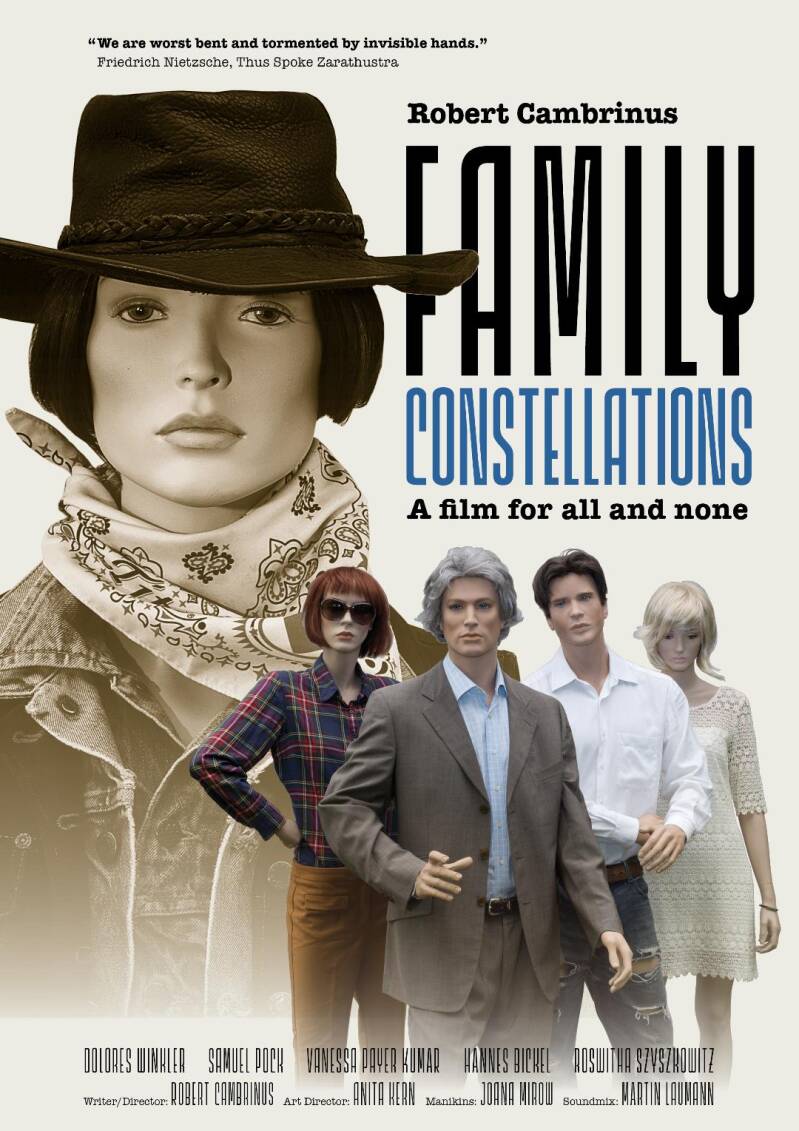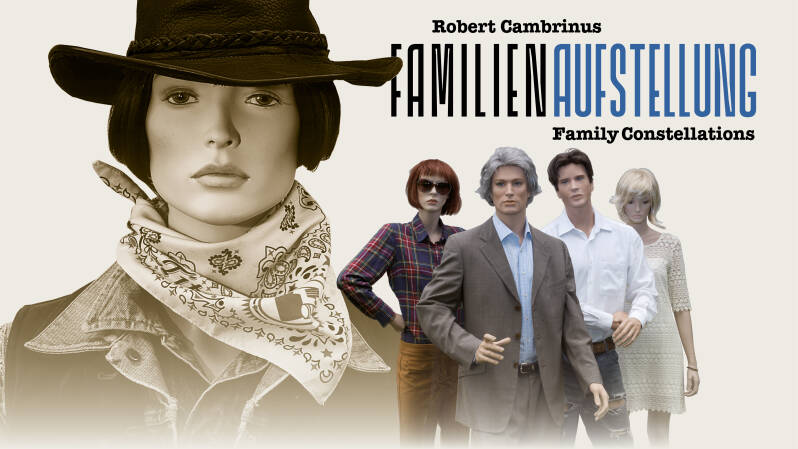
Family Constellations
"We are worst bent and tormented by invisible hands." (Thus Spoke Zarathustra, Friedrich Nietzsche)
Synopsis
A Nietzschean Zarathustra in the shape of a female travelling teacher seeks shelter in an Alpine chalet and challenges the family’s middle-class value system. The mother rejects the stranger outright. The son’s girlfriend does not understand her teaching. The father finds it trite as he has heard it all before. The son, however, is encouraged by the teacher’s words. He feels pressured into a career as a lawyer by his dominant father. All the son really wants is to become a writer and “to be free”. But the mix of philosophical aspiration and petty-bourgeois attitudes proves explosive.
All roles are played by shop-window mannequins.
Specs
Genre: Drama/Experimental
Production: AUT 2021
Running Time: 125 min 40 sec
Language: German
Subtitles: English
Shooting Format: 1080p in RAW
Original Aspect Ratio: 16:9
Sound Mix: Stereo 3.0
Film Festivals
New Horizons Film Festival (Wroclaw, Poland) — premiere
Jaipur International Film Festival (India) — Red Rose award
Asolo Art Film Festival (Italy)
Versions
Original version "Familienaufstellung/Family Constellations" 126 min
Alternative version "Familienaufstellung/Family Constellations" 91 min
Cartoonized version "Die Wanderlehrerin/The Itinerant Teacher" 91 min
Cast
Voices
Son — Samuel Pock
Teacher — Dolores Winkler
Father — Hannes Bickel
Mother — Vanessa Payer Kumar
Girlfriend — Roswitha Szyszkowitz
Interviewer — Martin Gross
Crew
Writer/Director — Robert Cambrinus
Art Director — Anita Kern
Camera/Sound/Edit — Robert Cambrinus
Dialogue Recording — Martin Laumann
Casting (Mannequins) — Joana Mirow
Drone Operator — Ralf Moschitz
Props Maker — Peter Marchart
Taxidermist — Helmut Raith
Sound Mixer — Martin Laumann
Shellac-Digitization — Franz Masser
Composer — Juan Pablo Trad Hasbun
DCP Production — Wolfgang Pielmeier
Stills Photographer — Vilma Pflaum
Stills Post Production — Thomas Bakos
Producer — Robert Cambrinus
Director's Statement
A question of form
A key aspect of my work concerns the destruction of illusion. I propose that it is not the “willing suspension of disbelief” (Samuel T. Coleridge) that brings about an immersive film experience, as is widely claimed, but rather the opposite: the awareness of the artificiality of the setup facilitates an uncompromised engagement with the film’s subject — what it is all about. I do not want to entertain an audience that sits back and passively consumes a spectacle. Manipulating an audience’s emotions covertly, may help to make them believe they are witnessing something moving or meaningful. But exposing the fictionality of film stimulates the intellect. The focus turns to meaning as the audience make their own discoveries. They become active participants and immerse themselves willingly.
About the puppets
Pierre Albert-Birot, a poet and playwright with Dadaist leanings, writes in a Parisian magazine in 1924: “The actor from flesh and blood has a heart and admirable joints. That is all too marvellous, he walks all by himself. [But] I want an actor from cardboard, who doesn’t have feelings and walks awkwardly. I want an actor who isn’t human. Only he will be wonderfully human, only he will not play a role. He will be the character.”
“The artificial body, the puppet (also marionette, manikin, waxwork, robot) as an opponent or double of modern man merges the highest fascination with the deepest horror.” (Uta Brandes in her preface to Tom Bieling’s Gender Puppets, 2008)
From Fritz Lang’s robot in Metropolis to Ridley Scott’s Blade Runner we find countless versions of artificial humans in film history. Shop-window mannequins have played almost no part so far. But on closer inspection their function as an image of man is compelling.
Shop-window mannequins conform to a socially and economically determined ideal in respect of looks, body shape and clothing with the intention to prompt the onlooker to aspire to this ideal (by buying the merchandise on display). At the same time, this constructed ideal must not be too far removed from the real world of potential customers so that they are able to identify with the idealised effigy. Therefore, decorators and marketing managers prefer to rely on gender politics in shop windows that are either conservative or, at least, clichéd. Mannequins have to be both aspirational (the ideal) and recognisable (the stereotype). It is this dual role that forms the basis for the relationship between onlooker and manikin, in which both parties influence each other.
In the 1950s film stars like Anna Magnani, Silvana Mangano and Gina Lollobrigida were used as templates for the production of mannequins. Today facial casts of models are used while the bodies assume a set of recognizable postures, each representing a particular attitude.
I believe that we all assume a personal stance early on, a default position that we adhere to for much, if not all, of our lives. Yes, we can move our limbs. Yet we can hardly change our position.
My mannequins are, like Albert-Birot’s cardboard figures, the perfect actors and actresses as their inanimate surfaces serve as blank canvasses, on which to project the images. They do not play roles. They are what they are – and what we see in them.
Film poster designed by Anita Kern
Henryk Tomaszewski
When Anita and I visited the Theatre Museum in Wroclaw, we came across a statement by Henryk Tomaszewski, the famous Polish actor, who also collected dolls: "For a child, lifeless toys do not exist." It is an ability we grown-ups have largely unlearned but it would do us good to tap into this forgotten capacity for boundless imagination every once in a while. Our shop-window mannequins invite the audience to do so.
Other Voices
“The director of Family Constellations completely disorients the viewer by replacing actors with mannequins and then breathing life into this world by meticulously staging the interactions and adding an extensive soundtrack imitating the sounds of people and objects.” Wojciech Tutaj
“Robert Cambrinus's Family Constellations tests the value of family heritage and prospects for the future. For Cambrinus, the Austrian director of a psychodrama with shop mannequins in the lead role, the family heritage and future are only a gloomy, sterile compulsion to reproduce hypocrisy and lies.” Małgorzata Sadowska


